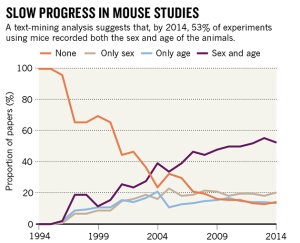The week in science: 4–10 March 2016
Wildlife trafficking on Facebook sparks concern; grizzlies delisted as endangered; and Japanese particle accelerator starts work.
POLICY
Nuclear research The US House of Representatives approved a bipartisan bill on 29 February supporting nuclear-energy research and development. The legislation, which seeks to promote engagement between the US energy department and private firms, would bolster existing research activities and direct the agency to create a new open-access nuclear-science facility. The US Senate has approved its own nuclear-research legislation as part of a larger energy bill, although progress has been stalled by disputes over federal funding to help the city of Flint, Michigan, to deal with lead contamination in its water supply.

Damir Sagolj/Reuters
EVENTS
Concern over Facebook wildlife trafficking Facebook has become a major marketplace for illegal trading in wildlife on mainland Malaysia, according to the non-profit organization TRAFFIC, headquartered in Cambridge, UK. A 3 March report showed that 80 live species were traded using 14 closed Facebook groups in just 50 hours of monitoring over 5 months. Half of the species were on sale illegally, including sun bears (Helarctos malayanus; pictured) and white-handed gibbons (Hylobates lar). Illegal wildlife trading had been considered less of a problem in peninsular Malaysia than in most of southeast Asia because of a lack of physical markets. TRAFFIC says that the findings may indicate a global shift in wildlife crime.
Quake warning fails Tsunami warning buoys off the coast of Indonesia all failed when a powerful undersea earthquake hit on 2 March, 800 kilometres west of Sumatra. In the wake of the deadly 2004 Indian Ocean tsunami, scientists deployed the array of buoys to observe unusual changes in water movement and sea level. But when the latest magnitude-7.8 quake hit, all 22 buoys were down. Officials with Indonesia’s Disaster Mitigation Agency blamed vandalism and a lack of funds for maintenance. Authorities issued a precautionary warning on the basis of the quake’s location and strength. The warning was lifted when no tsunami was triggered.
Poaching concern Elephant populations in Africa are still being driven down by poaching, according to the latest data from the Convention on International Trade in Endangered Species of Wild Fauna and Flora (CITES). A 3 March report from CITES notes that poaching continues to decline from its 2011 peak, but says that poachers probably took more animals from wild populations last year than were replaced by births. John Scanlon, the CITES secretary-general, warned in a statement that African elephant populations “continue to face an immediate threat to their survival”, especially in Central and West Africa, where poaching is highest.
Bear boom The US Fish and Wildlife Service has proposed removing the grizzly bear (Ursus arctos horribilis) from the list of threatened species under the Endangered Species Act. The change would apply to the bear population in and around Yellowstone National Park in the US northwest, where numbers have increased from as few as 136 in 1975 to more than 700 today. The proposal, announced on 3 March, would transfer authority for continuing recovery efforts to state management and Native American tribes, although federal biologists would continue to monitor the bears’ progress. Environmentalists are expected to challenge the proposal.
ExxonMobil probe The US Department of Justice has referred congressional requests for a probe into Texas-based oil company ExxonMobil to the Federal Bureau of Investigation (FBI). California representatives Ted Lieu and Mark DeSaulnier requested an investigation in October 2015 into whether the company broke the law by “failing to disclose truthful information” on climate change to investors and the public. A 12 January response from the Department of Justice, revealed publicly on 2 March, said that the FBI will determine “whether an investigation is warranted”.
Climate reporting US broadcasters reported on climate change less in 2015 than in 2014. A 7 March survey by non-profit organization Media Matters for America tracked coverage by the ABC, CBS, NBC and Fox networks on their evening and Sunday news shows. In 2015, they devoted a total of 146 minutes to climate reports, 5% down on 2014. ABC devoted the least time, at just 13 minutes. PBS, which was considered separately, featured 58 climate-change-related segments in its nightly news show in 2015, much more than the other channels, which aired a total of 48 segments between them.

Courtesy of Pacific Northwest Natl Lab.; CC BY-NC-SA 2.0
FACILITIES
Japanese collider Japan’s newest accelerator, SuperKEKB in Tsukuba, has circulated its first particles. The KEK laboratory announced on 2 March that in February, beams of electrons and their antiparticles, positrons, travelled at close to the speed of light around the accelerator’s 3-kilometre ring at separate times. Next year, SuperKEKB will run both beams together and smash the electrons and positrons inside the accelerator’s Belle II detector (pictured), to study the asymmetries between matter and antimatter. The experiment is designed to produce collisions at a rate at least 40 times faster than the original KEKB.
PEOPLE
Pachauri charged Police in New Delhi have filed charges against Rajendra Pachauri, executive vice-chairman of The Energy and Resources Institute (TERI), also in New Delhi, and former chairman of the Intergovernmental Panel on Climate Change. The charges, reportedly made on 1 March, follow a sexual-harassment complaint by a female TERI researcher in February 2015 and include: making physical contact, using unwelcome and “sexually coloured” remarks, stalking using e-mails and text messages, and criminal intimidation. Pachauri has denied all the allegations against him.
FUNDING
Funding fears The UK Research Councils have warned that government budget plans unveiled on 4 March “create pressures … that may have an impact on some existing commitments”. The government announced in November (see Nature 528, 20; 2015) that it would continue to place a ‘ring fence’ around the core science budget to protect it from cuts, holding it at £4.7 billion (US$6.7 million) in real terms. But the budget breakdown of planned allocations to the seven UK councils shows that, although the overall budget is increasing, the councils that support biological, physical, environmental, economic and humanities work will have smaller resource budgets by 2019. The agencies for medical research and facilities will see their funds increase.
Illumina chief The genome-sequencing giant Illumina announced on 7 March that Jay Flatley is stepping down as its chief executive — a post he has held since 1999. Under his tenure, the San Diego biotechnology firm has grown from a 30-person enterprise to a US$2.2-billion behemoth employing more than 4,800 people. More than 90% of all DNA sequencing data is now produced by Illumina machines. Flatley will be replaced by Illumina president Francis deSouza, and will become executive chairman of the company in July.

Source: Flórez-Vargas, O. et al. eLife http://doi.org/bc2d (2016)
TREND WATCH
In 2014, only around 50% of research papers recorded both the sex and age of the animals used in mouse studies. These details are needed for others to assess and reproduce the work. The analysis used software to trawl through some 15,000 open-access papers published between 1994 and 2014. Recording improved through the 1990s and 2000s, but standards plateaued after 2010 — despite the launch that year of a voluntary reporting checklistcalled the ARRIVE guidelines. See go.nature.com/vmehx5 for more.
NUMBER CRUNCH
8,000
The number of Sumatran orangutans living in the wild in addition to the number previously thought to exist there. A survey has found 14,600 of the critically endangered great apes in their natural habitat, more than previous surveys estimated. Some 4,500 animals are still threatened if planned deforestation continues.
|





